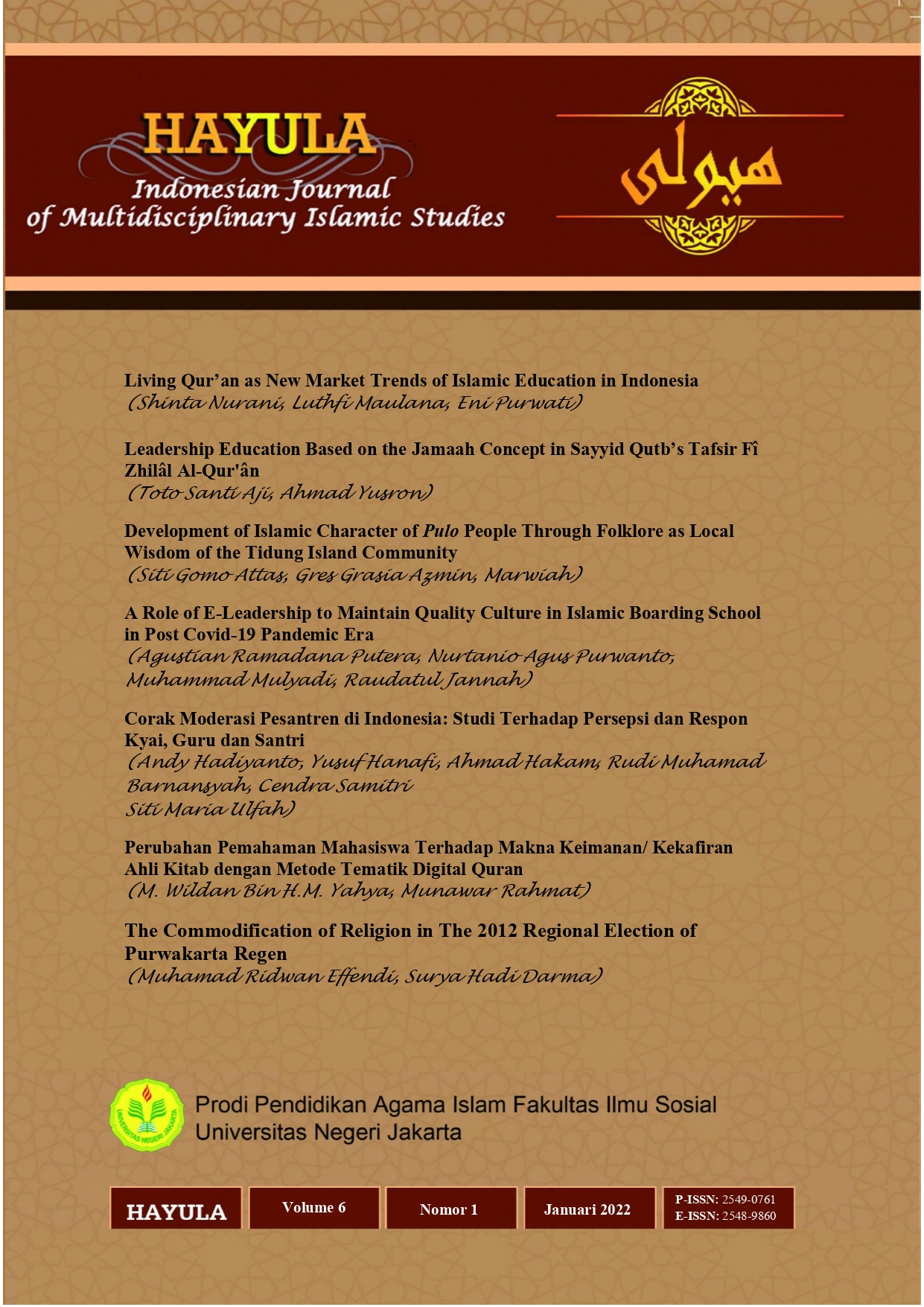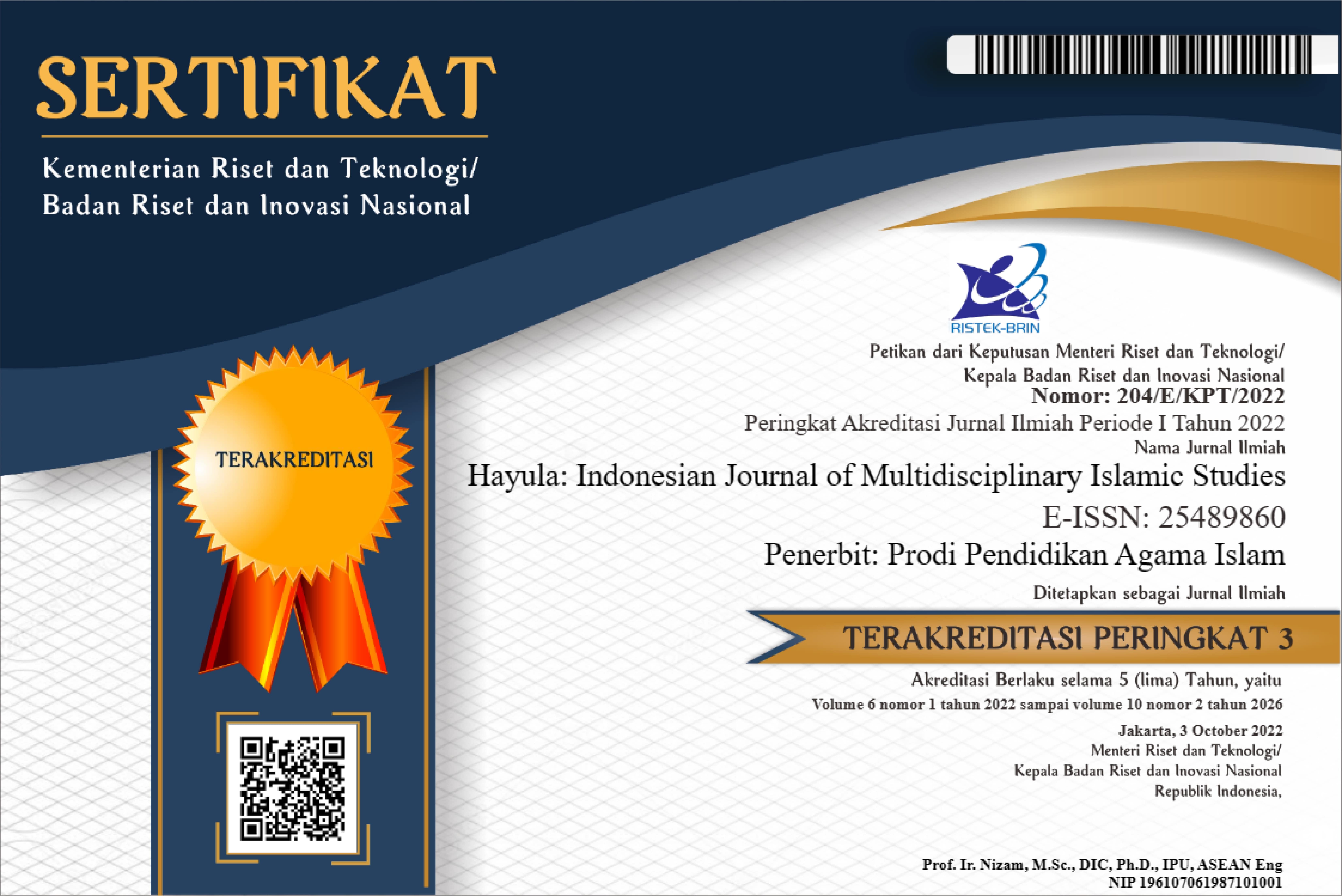Living Qur’an as New Market Trends of Islamic Education in Indonesia
DOI:
https://doi.org/10.21009/hayula.006.01.01Keywords:
living Qur'an, Market trends, Islamic education, pendidikan IslamAbstract
This research reviewed living Al-Qur’an as phenomenon and trend in learning Islamic Education in Indonesia. The causing factor is such as the moral panic of parents about modern-contemporary life. Many parents encourage their children to practice the Al-Qur'an, with the hope that the children will be more careful and fortify themselves from a free life. The panicked moral attitude of these parents is used by Islamic educational institutions as a market to gain capital gains, such as establishing an educational house/center based on living Qur'an learning. Several educational institutions also offer the concept of Islamic Boarding School, Tahfidz Center, and compete to use the Al-Qur'an as their product brand. This literature research used a social phenomenological science approach with the living Quran theory. This research found that 1) the trend of living Qur'an education in Islamic learning in Indonesian Islamic educational institutions was as a social impact of the spread of moral panic, 2) moral panic among parents of students became a new business field for managers of Islamic religious education institutions. 3) Al-Qur’an is a product that has its own market share, and 4) the phenomenon of living al-Quran was as a trend of Islamic education methods in Indonesia.
References
Ali, M. (n.d.). Kajian Naskah dan Living Quran dan Living Hadits. Journal of Quran and Hadith Studies, 4(2), 147–164.
Ali, Mukti. (2017). Mengkomunikasikan Pendidikan dan Melestarikan Kearifan Lokal Orang Bajo. Inferensi, 11(1), 187. https://doi.org/10.18326/infsl3.v11i1.187-206
Arybowo, S., Retnowati, E., & Buchari, M. S. (n.d.). Politik Kebudayaan dan Otonomi Daerah. Lembaga Ilmu Pengetahuan Indonesia.
Assingkily, M. S. (2019). Living Qur’an as a Model of Islamic Basic Education in the Industrial Era 4.0. Al Ibtida: Jurnal Pendidikan Guru MI, 6(1), 19. https://doi.org/10.24235/al.ibtida.snj.v6i1.3876
Assingkily, M. S., & Baroroh, R. U. (2017). Prototipe Living Qur’an Pendidikan Dasar di Madrasah Ibtidaiyah: Studi Kasus di MI Nurul Ummah Kotagede Yogyakarta. JOIES: Journal of Islamic Education Studies, 2(1), 136–162.
Bahjatulloh, Q. M. (2016). Pengembangan Pemberdayaan Ekonomi Masyarakat Melalui Kegiatan Filantropi (Studi Kasus Lembaga Tazakka DIII Perbankan Syariah IAIN Salatiga). Inferensi, 10(2), 473. https://doi.org/10.18326/infsl3.v10i2.473-494
Danandjaja, J. (2014). Metode Penelitian Kepustakaan. In Antropologi Indonesia (Vol. 0, Issue 52). Yayasan Obor Indonesia. https://doi.org/10.7454/ai.v0i52.3318
Fauziah, S. (2014). Pembacaan Al-Qur’an Surat-Surat Pilihan Di Pondok Pesantren Putri Daar Al-Furqon Janggalan Kudus (Studi Living Qur’an). Jurnal Studi Ilmu-Ilmu Al-Qur’an Dan Hadis, 15(1), 159. https://doi.org/10.14421/qh.2014.15108
Fawaz, A. (n.d.). Living Qur’an Di Instansi Kesehatan: Fenomena “Gerakan Membaca Al-Quran Sebelum Bekerja” Di Rumah Sakit Islam Sultan Agung Semarang. HERMENEUTIK, 13(1), 117–130.
Fuad, A. F. N. (2018). The Islamists’ Responses to Modernity and Their Notion of Active Da’wa. Jurnal Afkaruna, 15(2), 187–202.
Gora, R. (2014). Hermeneutika Komunikasi. In Deepublish. Deepublish. https://books.google.co.id/books?hl=id&lr=&id=y7eUDwAAQBAJ&oi=fnd&pg=PP1&dq=hermeneutika&ots=ZXByTYfKa&sig=sdjpU04FiRCHQlp0BTlAmcLxJw&redir_esc=y#v=onepage&q=hermeneutika&f=false
Habiburrahman, H. (2019). Islam dan Kapitalisme; Titik Temu dan Kritik Dalam Al-Qur’an. Indonesian Journal of Religion and Society, 1(1), 38–50. https://doi.org/10.36256/ijrs.v1i1.23
Hakim, R. (2014). Pembentukan Karakter Peserta Didik Melalui Pendidikan Berbasis Al-Quran. Jurnal Pendidikan Karakter, 0(2), 123–135. https://doi.org/10.21831/jpk.v0i2.2788
Imelda, A. (2018). Implementasi Pendidikan Nilai Dalam Pendidikan Agama Islam. Al-Tadzkiyyah: Jurnal Pendidikan Islam, 8(2), 227. https://doi.org/10.24042/atjpi.v8i2.2128
Junaedi, D. (2015). Living Qur’an: Sebuah Pendekatan Baru dalam Kajian AlQur’an (Studi Kasus di Pondok Pesantren AsSiroj AlHasan Desa Kalimukti Kec. Pabedilan Kab. Cirebon). Journal of Qur’an and Hadith Studies, 4(2), 169190.
Kato, H. (2014). Islamic Capitalism : The Muslim Approach to Economic Activities in Indonesia. Comparative Civilizations Review, 71(71), 90–106.
Kemenpora. (2008). Penyajian Data Informasi Kementerian Negara Pemuda dan Olahraga Tahun 2008. Biro Perencanaan Sekretariat Kementerian Pemuda dan Olahraga.
Khadimulquran. (n.d.). Biaya Pendidikan Dauroh Al-Quran. https://www.khadimulquran.id/biaya/
Kholis, N., Mufidah, N., & Indriharta, L. (2019). Implimentasi Budaya Living Quran Di Sekolah. EDUKASI: Jurnal Penelitian Pendidikan Agama Dan Keagamaan, 17(2), 125–134.
Mahfudin, R., Wajdi, F., & Ismail, Y. (2017). Konsep pendidikan Islam KH Abdullah bin Nuh dan Relevansinya Dengan Pendidikan Islam Modern. Jurnal Studi Al-Qur'An, 13(2), 143-157.
Maulidizen, A. (2019). Business Ethics: Analysis of al-Ghazali’s Economic Thought With Sufism Approach. Religia, 22, 160. https://doi.org/10.28918/religia.v22i2.2067
Muiz, A., Danial, Gaffar, A., & Syamsuddin. (2018). Study Living Qur’an: The Analysis of Understanding Surah al-Nahl (125) against Demonstration-Based Communication Behavior. IOP Conference Series: Earth and Environmental Science, 175(1), 12180. https://doi.org/10.1088/1755-1315/175/1/012180
Mustakim, Abdul. (2007). Metode Penelitian Living Qur’an (S. Syamsuddin (ed.)). Teras.
Naloka, A., & Amalia, G. (2017). Landasan Pendidikan Dasar Pengenalan Diri Sendiri Menuju Perubahan Hidup Edisi. In Cet. 1 (Issue Landasan Pendidikan.). Kencana.
Nurani, S. (2019). Salafi, Media Baru dan Moral Panic; Studi Atas Majlis Al-Khidhir. Jurnal
Aqlam Journal Of Islamic and Plurality, 4(1), 134–149. http://journal.iain-manado.ac.id/index.php/AJIP/article/view/913
Pendidikan, M. R.-A. J. M., & 2019, undefined. (n.d.). Kapitalisme Pendidikan Islam.
Ejournal.Iaiskjmalang.Ac.Id,1(2),162–175. http://ejournal.iaiskjmalang.ac.id/index.php/akad/article/view/66
Peter Connoly (Ed.). (2002). Aneka Pendekatan Studi Agama (terj). Yogyakarta.
Pollock, R. (1946). An Essay on Man. In Thought (Vol. 21, Issue 2). Yale University Press. https://doi.org/10.5840/thought194621288
Purwaningrum, S. (n.d.). Elaborasi Ayat-Ayat Sains dalam Al-Quran : Langkah Menuju Integrasi Agama dan Sains dalam Pendidikan. Inovatif, 1(1), 124–141.
Purwanto, N. (2015). Strategi Bersaing Dalam Bisnis Pendidikan. Jurnal Manajemen Pendidikan, 7(1), 9–16.
Putra, A. (2019). Kajian Al-Qur’an Di Indonesia (Dari Studi Teks Ke Living Qur’an). TAJDID : Jurnal Ilmu Keislaman Dan Ushuluddin, 21(2), 28–36. https://doi.org/10.15548/tajdid.v21i2.221
Putra, H. S. (n.d.). The living Al-Quran: Beberapa Perspektif Antropologi. Jurnal Walisongo, 20(1), 236.
Romdhoni, A. (2019). Semiotik Metodologi Penelitian. Literatur Nusantara.
Swardi Endrawangsa. (2006). Metode, Teori, Teknik Penelitian Kebudayaan. Pustaka Widyatama.
Syamsudin, S. (2007). Metodologi Penelitian Living Qur’an dan Hadis. In TH-Press. TH. Press.
Tan, C. (2014). Reforms in Islamic Education. In Reforms in Islamic Education. Bloomsbury. https://doi.org/10.5040/9781472593252
Ulum, M. (2018). Eksistensi Pendidikan Pesantren : Kritik Terhadap Kapitalisasi Pendidikan. Tarlim : Jurnal Pendidikan Agama Islam, 1 No.2 Jul(2), 20–37.
Untung, S. (2019). Masjid Dan Aktivitas Dakwah Di Era Revolusi Industri 4.0. Religia, 22(2). https://doi.org/10.28918/religia.v22i2.2069
Wahyuni, T. (2019). Pembacaan Al-Qur’an Di Ruang Publik : Refleksi Pembentukan Karakter Religius Siswa Ditengah Kepanikanmoral. Jurnal Kajian Kritis Pendidikan Islam Dan Manajemen Pendidikan Dasar, 2(1), 80–98.
Wajdi, F., & Aulia, R. N. (2019). Ma ‘had'Aly and the Challenge of Modernizing Islamic Education in Indonesia. Hayula: Indonesian Journal of Multidisciplinary Islamic Studies, 3(2), 173-190.
Zed, M. (2008). Metode Penelitian Kepustakaan. Jakarta: Yayasan Obor Indonesia.
Downloads
Published
How to Cite
Issue
Section
License
Authors who publish with this Journal agree to the following terms:
- Author retain copyright and grant the journal right of first publication with the work simultaneously licensed under a creative commons attribution licensethat allow others to share the work within an acknowledgement of the work’s authorship and initial publication of this journal.
- Authors are able to enter into separate, additional contractual arrangementfor the non-exclusive distribution of the journal’s published version of the work (e.g. acknowledgement of its initial publication in this journal).
- Authors are permitted and encouraged to post their work online(e.g. in institutional repositories or on their websites) prior to and during the submission process, as it can lead to productive exchanges, as well as earlier and greater citation of published works.
Users/public use of this website will be licensed to CC BY







